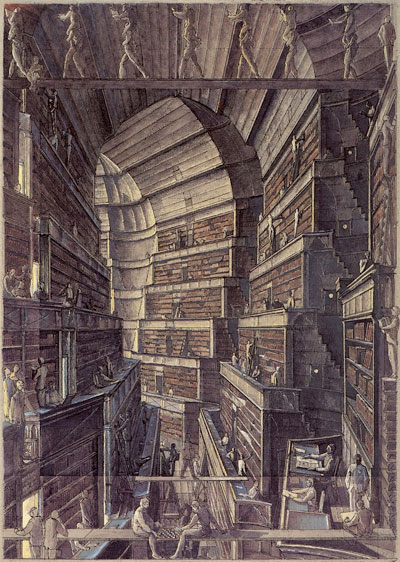
|
| An illustration of the Library of Babel by Erik Desmazieres |
- The idea of a total library
- The futility of such a library
Librarians are “total” in their desire for a perfect, complete library. Unfortunately, this totalizing mindset can fossilize into the belief that if something isn’t in the library, it doesn’t exist. The promise of total, accessible knowledge (the first preoccupation) is shadowed by the futility of searching through miles of records for that one essential piece (the second preoccupation). Catalogers perpetually compare the catalog to the shelf, hoping for a perfect match—a Sisyphean task that is never truly finished. This struggle isn’t unique to librarianship but echoes throughout Western philosophy. Ever since Thales posited that all existence rests on a single principle, thinkers have sought an absolute—a “univocity”—that undergirds reality. The search remains forever unfinished, yet it continues.
Borges as Librarian
Jorge Luis Borges knew these struggles firsthand. He worked for nine years in “solid unhappiness” as a municipal librarian in Buenos Aires, laboring as a cataloger in a library overstaffed and underfunded. The job was tedious, and office politics abounded; Borges was eventually dismissed for his political outspokenness, only to later become the director of Argentina’s National Library after the fall of Juan Perón. His ambivalence toward libraries—both a haven and a cross—deeply informs his fiction.
Outline of “The Library of Babel”
In Borges’s seminal story, first published in Ficciones (1941), the universe is imagined as a “total library”—an endless series of hexagonal cells, each filled with shelves and books, forming an infinite labyrinth. This library contains every conceivable book, written in every possible combination of letters, spaces, and punctuation. Yet for all its promise of totality, the library is a hellish paradox: endless, empty, and impossible to navigate. Librarians search for meaning, only to find futility. The narrator’s melancholy confession—“I have wandered in search of a book… now I am preparing to die”—underscores the existential cost of the quest.
The Paradox of Knowledge
The library becomes a metonym for the universe: everything can be known, yet nothing is accessible in totality. Our desire for a perfect book, a key to all mysteries, is both motivating and maddening. Borges’s vision anticipates the digital age’s anxiety: limitless information, impossible completeness. The labyrinth is not only architectural but epistemological—a maze of knowledge and meaning.
Babel, Labyrinths, and Daedalus
Just as the mythic Tower of Babel represented humanity’s quest for divine knowledge—and its subsequent confusion—so too does Borges’s library mirror the fate of Daedalus’s labyrinth: ingenious, infinite, and ultimately confounding. In Kabbalistic thought, the “breaking of the vessels” (shevirat ha-kelim) suggests a world in fragments, always striving toward restoration (tikkun). Borges’s library, composed of infinite, broken volumes, is a literary echo of this spiritual quest.
Labyrinths as Metaphor for Knowledge
The word “labyrinth” evokes the endless, twisting passages of both libraries and the mind. Like Daedalus, who designed the labyrinth for King Minos, librarians and philosophers design systems that often trap them in complexity. The labyrinth, as Borges writes, is “a labyrinth devised by men, a labyrinth destined to be deciphered by men.” Our search for meaning—personal, philosophical, or academic—is always a journey through the maze.
Teach the Labyrinth: Daedalus Myth Resource
Want to explore the paradox of knowledge and the myth of the labyrinth in your classroom? Dive into the story of Daedalus—the original mythic architect! This classroom-ready, standards-aligned resource offers discussion prompts, engaging readings, and activities that help students connect Greek myth to philosophy and literature.

|
| I sell Humanities and English resources at my TpT store! |
Works Cited & Further Reading
- Alazraki, Jaime. Jorge Luis Borges. Columbia UP, 1971.
- Barenchea, Ana Maria. Borges: The Labyrinth Maker. NYU Press, 1965.
- Borges, Jorge Luis. Labyrinths: Selected Stories and Other Writings. New Directions, 1962.
- Bell-Villada, Gene H. Borges and His Fiction: A Guide to His Mind and Art. UNC Press, 1971.
- Christ, Ronald. “Jorge Luis Borges.” The Paris Review: Latin American Writers at Work. Modern Library, 2003.
- Cohen, J.M. Jorge Luis Borges. Croythorn House, 1974.
- Guibert, Rita. Seven Voices: Seven Latin American Writers Talk to Rita Guibert. Vintage, 1972.
- Hofstadter, Douglas R. The Mind’s I. Basic Books, 1981.
- Scholem, Gershom. Major Trends in Jewish Mysticism. Schocken, 1946, 1974.
- Stark, John O. The Literature of Exhaustion: Borges, Nabokov, and Barth. Duke UP, 1974.
- Williamson, Edwin. Borges: A Life. Penguin Books, 2004.

No comments:
Post a Comment
Be courteous. Speak your mind. Don’t be rude. Share.